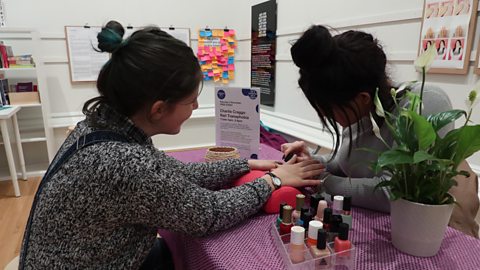Trans myths debunked: 'They're not just handing out vaginas in the street!'
Transgender issues have come to the forefront over the last few years - but are we seeing more myths than facts? Trans activist Charlie Craggs thinks so.

Charlie's Story
From the age of four, Charlie told her mum, “I wish I was a girl.” Playing only with girls and girls’ toys, she knew she was a feminine boy - but struggled to define her true feelings.
“I’m from a council estate in Ladbroke Grove [in London] – it wasn’t in our vocabulary as a culture. Trans just wasn’t a thing," she told 5 live's Nihal Arthanayake and Sarah Brett.
After seeing positive portrayals of trans people on TV, Charlie finally understood who she was and transitioned aged 21. But early on in the process, a traumatic sexual and physical assault at a bus stop changed her outlook completely.

Although a woman across the road eventually stepped in to help, Charlie was astounded that no other bystanders had intervened earlier – or supported her after the attack.
There’s no point arguing. It’s about educating.”Charlie
It prompted her to set up the “Nail Transphobia" campaign, in which she travels around the UK offering free manicures to members of the public, in return for a chat with a trans person.
Charlie hopes talking openly will help tackle some of the common misconceptions she believes lead to hate crimes – something she suffers with "on a daily basis".
“Most days it doesn’t get to physical or sexual assault level – it’s normally verbal,” Charlie said. “But a few times when I argue back it has become physical. My life isn’t worth arguing with bigots. There’s no point arguing. It’s about educating.”

How I'm tackling transphobia with manicures
Charlie Craggs is fighting transphobia and misconceptions with her pop-up nail salon.
So, what are some of the trans myths Charlie wants to tackle?
And what’s the truth behind them? We called on three experts for help:
- Professor Kath Browne from the University of Brighton - she works with those who have been marginalised because of their sexual and gender identities
- Finn Greig, Head of Youth Work at the charity Gendered Intelligence - which supports young trans people aged eight and upwards
- Dr. Christina Richards, from the Nottinghamshire Gender Identity Clinic

Myth one: Trans children are having surgery

Dr. Christina: “I think this is a common concern amongst people, especially with very young children. It’s just not the case – trans children are not having surgery… In the UK you have to be over 18 in order to have genital surgery."
[We should] think about what restricting gender does to all children – not just trans kids"Professor Kath Browne, University of Brighton
Finn: “Young people who attend our youth services… know that they can’t access surgery until they’re a lot older. That’s quite a well-known thing amongst young trans people.”
Pretty clear then - young people can’t get surgery in the UK until they are 18. So, where is this myth coming from?
Professor Kath: “I think it’s coming from a very specific sector of society which wants to really push back on gender and sexual liberation… that really wants to say: ‘We want to go back to a man, woman and children lifestyle’, and ‘Men are men and women are women.’ Once we start to get in to that, we get into a really difficult and contested terrain.
"[We should] think about what restricting gender does to all children – not just trans kids. What does it do to boys who want to play with dolls, or girls who want to be scientists?"

One common retort is that allowing children to explore their gender could lead to confusion, or gender dysphoria misdiagnosis. Dr Christina thinks the notion is “absurd”.
They’re not handing out vaginas on the street!"Charlie
“We don’t question cisgender [non-trans] children about what their gender is... What we’re not talking about is a young child who wakes up in the morning and says, ‘Oh actually, I’m a boy’ or ‘Actually, I’m a girl’ – and we immediately whip them into hospital. That’s an absurd position. What we’re talking about here is children who have a persistent and long-standing feeling, and for those children to be assessed by specialist doctors."
Charlie: “I’d like to find someone who has had surgery at 18! Let me tell you something – I went to my GP in 2013. It’s 2018 almost and I’m still waiting for my surgery. They’re not handing out vaginas on the street!”
Myth two: Being trans is a ‘mental illness’

Dr. Christina: “Trans people aren’t mentally ill. The American Psychiatric Association published a position statement in 2013 that made that clear... they stopped using the word disorder and changed it to dysphoria, which means feeling unhappy about something.
The link between mental health and gender dysphoria is about discrimination"Professor Kath
"Having said that, you do get high rates of suicidality and self-harm amongst trans folk. The reason for that, is what we call "minority marginalisation stress" – stress at being part of a group which is subject to prejudice.
"And actually, what you find is, if you remove that prejudice, the suicidality and self-harm goes."

Professor Kath: “The link between mental health and gender dysphoria is about discrimination – that every day experience of going out and being shouted at, and if you challenge the shouting, you have the potential to have a violent confrontation.
"That daily grind of transphobia can be as subtle as a look or a joke that you make with your friends. These things are very, very hurtful and have massive implications for people’s lives and happen on a daily basis.”
Myth three: Being trans involves surgery

Dr Christina: “For some people, transitioning definitely involves surgery and it’s a really important part of... their identity, just as having the right physicality is for non-trans people.
"It’s important in terms of looking at yourself in the mirror, recognizing yourself, sexual contact, getting changed, going swimming, all sorts of things.
"But for a lot of trans people, it doesn’t involve surgery. The question is whether it suits that particular person."

Charlie: “I have lots of trans friends who don’t feel like they need surgery or who might want surgery to a certain point – they might have top surgery but not bottom... some people don’t even want to take hormones. Everyone’s path into manhood or womanhood is different.
If you’re not going to ask Brenda next door, ‘What have you got in your pants?’ - then don’t ask us!”Charlie
“Often the first question [trans people] are asked... is “have you had the surgery?” And firstly, I’m like, ‘What surgery? Because there’s several surgeries. And second of all, It’s quite rude to ask that. Do you like, ask everyone you meet that?'
"We are humans. We just wanted to be treated as humans. Trans people don’t want special rights, we just want human rights. We just want to be treated as everyone else. If you’re not going to ask Brenda next door, ‘What have you got in your pants?’ then don’t ask us!”
You can hear Charlie’s fascinating full-length guest edit of Afternoon Edition in the clip below.

The Long Listen: Charlie Craggs debunks trans myths
Charlie Craggs debunks myths about trans people - with help from a team of experts.




